Errare humanum est – o niebezpieczeństwach błędów i pożytkach z omylności (Agnieszka Bąbel)
Błądzenie jest wpisane w ludzką kondycję – zamiast więc postrzegać omyłki jako godną ukrycia część pracy naukowej, pragniemy pochylić się nad nimi z uwagą i dostrzec ich szczególną wartość. Popełnione błędy mają często ogromne konsekwencje w takich dziedzinach, jak edytorstwo naukowe (mylne odczytania rękopisu, błędy druku, omyłki autora, problem wyboru najlepszej podstawy wydania, sporne lekcje w różnych przekazach autentycznych, sygnalizowanie koniektur i emendacji itp.), badania nad biografią twórców lub interpretacja tekstów kultury (np. nadinterpretacje). Mylne tropy często wydają się bardzo kuszące i odkrywcze, dlatego też warto przeanalizować najczęstsze mechanizmy ich powstawania (i powtarzania) oraz sposoby na ich mozolne prostowanie (skrupulatna analiza bazy materiałowej – „powrót do źródeł”). Porządek sformułowanych już w starożytności zasad pracy nad tekstem utworu literackiego do dzisiaj właściwie pozostaje niezmienny: począwszy od lectio (prawidłowe odczytanie tekstu) i emendatio (poprawienie zniekształconych miejsc tekstu, uzasadnione skorygowanie dostrzeżonych w przekazie błędów), przez enarratio (omówienie tematu, wątków i motywów oraz sposobu ich ujęcia – analiza i interpretacja), aż po wieńczące pracę iudicium (sąd o dziele – wartościowanie).
Wartą poruszenia kwestią jest również sama świadomość historycznej zmienności przyjętych norm – refleksja badawcza nad sytuacjami, w których powszechnie powtarzany błąd w końcu staje się zalecanym wzorcem. Szczególnie intrygującym przypadkiem wydaje się też „fortunny błąd”: omyłka spowodowana przyjęciem zbyt pochopnych założeń, która jednak staje się punktem wyjścia dla nowych kierunków badań i niezwykłych odkryć.
XXVI numer „Napisu” gromadzi teksty z różnych dziedzin, począwszy od filozofów i historyków nauki, poprzez literaturoznawców, po edytorów, tekstologów i redaktorów, czerpiących przykłady z własnej praktyki.
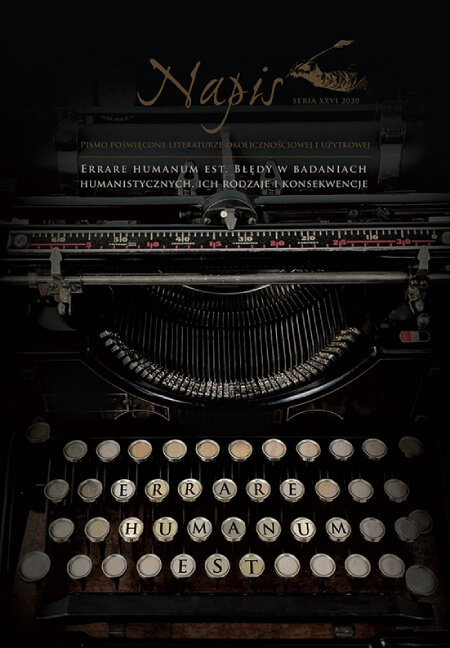
Errare humanum est – o niebezpieczeństwach błędów i pożytkach z omylności (Agnieszka Bąbel)
Edward M. ŚWIDERSKI
Just where is the error? Or: epistemology as the history of error?
Artykuł (PDF) Show abstract Hide abstract Pokaż abstrakt Ukryj abstrakt
This essay is not concerned with what philosophers have said about truth and error, but rather with how they increasingly turned their gaze back on their philosophizing itself, having grown suspicious that they are conducting their studies in the wrong way. The advent of modern philosophy came on the heels of the erosion of the ‘classical’ world view passed down from the Greeks and the Medievals in thrall to transcendental Truth, Beauty, and Goodness. Philosophical scepticism reared its head as the new science prompted doubts about the reach of human knowledge – how do we determine whether our beliefs about the ‘world’ amount to objective knowledge at all? The search for what were later to be called ‘foundations of knowledge’ began, a search that gave rise to ‘epistemology’. Matters reached an early critical point in Kant’s Critiques. Subsequently, it became rare to come across the philosophers who would not adopt, to some degree, a self-reflexive stance with respect to their ‘methods’. The author of the article proposes a random sampling of some recent critical self-reflexion, the conclusion of which is that the epistemological turn in modern philosophy has been largely a mistake or at least is deficient in essential respects. Charles Taylor questions the ‘representationalist’ concept of epistemology stemming from Descartes; historians of science (Lorraine Daston, et al.) examine how the priority attributed to the image of the autonomous rational mind ran against the grain of concrete scientific practice. It is merely a step to consider a proposal for a ‘communitarian epistemology’ in which reliable testimony and trust displace the standard reliance on the perceptions and inferential powers of the individual knower. The author recalls Thomas Kuhn’s controversial thesis concerning ‘scientific revolutions’ which put in question both the belief of science’s ‘convergence’ on the truth and of the (im-)possibility of epistemological realism. Concerns about realism/ antirealism also raise questions about the status of the things believed to exist: are most of us in error in believing that the everyday ‘manifest image’ of the world is consistent with the ‘scientific image’ advanced presented by physics? The author concludes with an account of ‘error theory’ in today’s moral philosophy according to which the belief that value-statements have meaning insofar as they refer to objective values is false. But let the illusion be granted, for although it is an error to think such statements are true, they do enjoy a performative role within our communities.
In conclusion: the history of epistemology and its applications has been concerned with rooting out what cannot be correct in approaches to questions about knowledge, truth, and error. It remains to wonder whether we do ‘know’ what the correct approach is.
Niniejszy artykuł nie zajmuje się tym, co filozofowie mówili na temat prawdy i błędu, ale raczej tym, jak stopniowo zaczęli się oni przyglądać swoim filozoficznym rozważaniom jako takim, pod wpływem swoich rosnących podejrzeń o to, że nie prowadzili swoich badań w należyty sposób. Współczesna filozofia nadeszła w ślad za erozją „klasycznej” wizji świata, przekazanej przez Greków i ludzi średniowiecza, pozostających w niewoli pojęć transcendentalnej Prawdy, Piękna i Dobra. Sceptycyzm filozoficzny dał o sobie znać, gdy nowa nauka sprowokowała wątpliwości odnośnie zasięgu ludzkiej wiedzy – jak zbadać, czy nasze przekonania o „świecie” są obiektywną wiedzą? Rozpoczęło się poszukiwanie, jak to później zostało ujęte, „podstaw wiedzy” – kwerenda, która dała początek „epistemologii”. Wczesne apogeum wydarzeń wyznaczyły Krytyki Kanta. Od tamtej pory do rzadkości należeli filozofowie, którzy nie przyjęliby, do pewnego stopnia, postawy autorefleksyjnej w odniesieniu do swoich „metod”. Autor artykułu proponuje losowy dobór przykładów współczesnej autorefleksji, której wynik wskazuje na to, jakoby epistemologiczny kierunek współczesnej filozofii był, w dużej mierze, błędem, lub przynajmniej jakoby był to kierunek niekompletny w kluczowych aspektach. Charles Taylor kwestionuje „reprezentacjonistyczną” koncepcję epistemologii wywodzącą się z nauk Descartes’a; historycy nauki (Lorraine Daston i inni) rozważają, w jaki sposób wartość nadrzędna przypisywana wizerunkowi autonomicznego, racjonalnego umysłu była niezgodna z konkretną naukową praktyką. To jedynie krok od uznania założenia „komunitarystycznej epistemologii”, w której wiarygodne świadectwo i zaufanie wypierają standardowe poleganie na percepcji i sile dedukcji indywidualnego poznającego. Autor przypomina kontrowersyjną tezę Thomasa Kuhna dotyczącą „naukowych rewolucji”, podających w wątpliwość zarówno wiarę w „dążenie” nauki do prawdy, jak i (nie)możliwość istnienia epistemologicznego realizmu. Obawy o realizm/ antyrealizm rodzą także pytania odnośnie statusu rzeczy, w których istnienie wierzymy: czy większość z nas jest w błędzie wierząc, że codzienny „manifestujący się obraz” świata jest spójny z „naukowym obrazem” prezentowanym przez fizykę? Autor podsumowuje artykuł przykładem „teorii błędu” w dzisiejszej filozofii moralności, zgodnie z którym fałszywe jest przekonanie, jakoby deklaracje wartości miały sens dopóty, dopóki odnoszą się do wartości obiektywnych. Pozwólmy jednak na tę iluzję, bo choć błędnym jest myśleć, że takie deklaracje są zgodne z prawdą, to jednak pełnią one performatywną rolę w naszych społecznościach.
W rezultacie: historia epistemologii i jej zastosowań skupia się na wykorzenianiu tego, co nie może być poprawne w podejściu do zagadnień związanych z wiedzą, prawdą i błędem. Pozostaje zastanawiać się nad tym, czy na pewno „wiemy”, co jest poprawnym podejściem.
Константин БАРШТ
Об ошибках в научном поиске, и в текстологии в частности
Artykuł (PDF) Show abstract Hide abstract Pokaż abstrakt Ukryj abstrakt Показать изложение текста Скрыть изложение текста
Konstantin Barszt
The article analyses the genesis, ontology and pragmatic function of an error as an inseparable part of the research process, in all fields of science. By studying the outlooks of many scholars and philosophers on this issue, the author draws conclusions relating to the fundamental importance of the ‘point of view’ in the ontological, ethical and pragmatical aspects. Academic studies are explored in the article as one of the three basic methods of acquiring knowledge that operate in the cultures of the world. At the same time, the article highlights a whole array of differences in communication between individuals, which transpire between artistic creation, religious experience and scientific inquiry. A distinct difference between scientific error (which can have a positive effect) and scientific inaccuracy, insufficiency (shortcomings) or incompleteness is also articulated. The analyses of drafts by Fyodor Dostoevsky, as well as of the concept of ‘intertextuality’ by Julia Kristeva and ‘intersubjective dialogue’ by Mikhail Bakhtin, serve as examples of such errors.
Konstantin Barszt
W artykule analizuje się genezę, ontologię i funkcję pragmatyczną błędu jako nierozdzielnej części procesu badawczego we wszystkich dziedzinach nauki. Badając poglądy na tę kwestię, wyrażane przez wielu uczonych oraz filozofów, autor wyciąga wnioski o fundamentalnej ważności kategorii „punktu widzenia” w aspekcie ontologicznym, etycznym i pragmatycznym. Badania naukowe są tu traktowane jako jedna z trzech podstawowych metod zdobywania wiedzy, funkcjonujących w kulturach świata – zostaje przy tym podkreślony cały szereg różnic pod względem komunikacji między jednostkami, jaki zachodzi na linii twórczości artystycznej, doświadczenia religijnego oraz naukowych dociekań. Wyraźnie formułuje się też różnicę pomiędzy błędem badawczym (który może mieć charakter pozytywny) a naukową niedokładnością, niedostatecznością (brakiem) czy niekompletnością. Jako przykłady takich omyłek służą analizy brulionów Fiodora Dostojewskiego, a także koncepcja „intertekstu” Julii Kristevej oraz „intersubiektywnego dialogu” Michaiła Bachtina.
Предлагается аналитическое рассмотрение генезиса, онтологии и прагматической роли научной ошибки как неотъемлемой части научного процесса во всех областях знания. Анализируются взгляды на этот предмет ряда ученых и философов, делается вывод о кардинальной важности категории «точки зрения» в ее онтологическом, этическом и прагматическом аспектах. Научный поиск рассматривается в роли одного из трех основных методов выработки знания, принятых в мировой культуре, с указанием на ряд отличий в параметрах межличностной коммуникации между художественным творчеством, религиозным поиском и научным исследованием. Формулируется методологическое отличие научной ошибки, которая способна иметь позитивный характер, от научной неточности, недостаточности или неполноты. В качестве примеров такого рода анализируется черновая запись Ф. М. Достоевского, а также концепция «интертекста» Ю. Кристевой в сравнении с идеей «межсубъектного диалога» М. Бахтина.
Tadeusz BUDREWICZ
„Długie trwanie” pomyłek (Maria Konopnicka, Maria Bartusówna, Napoleon Ekielski, Florentyna Niewiarowska)
Artykuł (PDF) Show abstract Hide abstract
The article proposes that the origins of humanists’ errors are material (incomplete sources) and psychological (the imperfectness of the researcher’s mind, a disregard of responsibilities and of the state of research). Through examples of the editing of the works by Maria Konopnicka, the paper demonstrates how editors made mistakes, which have been duplicated in editions of her texts for over one hundred years. Using the works of Maria Bartusówna, Napoleon Ekielski and Florentyna Niewiarowska as an example, the article also highlights how incorrect bio-bibliographical information is unquestioningly carried forward into subsequent publications, and how it is popularised through the Internet. A mistake in attribution made once leads to irreversible results of erroneous interpretations of works. It also affects the appreciation of particular authors.
Marlena SĘCZEK
Ślady zapomnianej tożsamości. O roli źródeł w biografii Janusza Korczaka
Artykuł (PDF) Show abstract Hide abstract
The figure of Henryk Goldszmit (Janusz Korczak) is the topic of many bibliographical publications. In the face of a lack of strictly scholarly works in this field, texts, in which the boundary between fact and author’s interpretation is very fluid, seem to gain more importance. The aim of the article is to point out the issues stemming from this, and to highlight the importance of bibliographical works based on archival research and reliable criticism of sources. Juxtaposing the first chapters of An Attempt at a Biography by Joanna Olczak-Ronikier with a documentary take on the genealogy of the Old Doctor allows one to state that even those narratives, which are the most suggestive and attractive to the reader, cannot fill the gaps in historical knowledge. Without referring to the archives, verifying arguments regarded as obvious, or without a philological reflection on the texts by Korczak, the chances to correct the errors which build up and shape the contemporary reception of the legacy of Henryk Goldszmit, diminish.
Grażyna PAWLAK
Epizod wojennej biografii Jana Parandowskiego. Majątek Planta pod Opatowem
Artykuł (PDF) Show abstract Hide abstract
The article concentrates on a small excerpt from the biography of Jan Parandowski, covering a two-year stay of the writer on the estate of the Morawscy family in Kielce Voivodeship. The article presents, using this singular example, the life of a Polish manor house during the German occupation. The mansion was crowded with refugees and displaced people, forced to deal with the wartime reality. The image of this community is dominated by the owners of the estate, a family whose tradition and ethos obligates them to take on difficult and dangerous challenges. In the face of the still-circulating incomplete, or false, information relating to the place of stay of the writer following his departure from Warsaw, the main aim of this text is to systematise the knowledge and to remove doubt surrounding this topic.
Izabela PONIATOWSKA
Doktor Murek zredukowany, doktor Murek zrehabilitowany. Recepcja twórczości Tadeusza Dołęgi-Mostowicza wobec postrzegania literatury popularnej w polskich badaniach historycznoliterackich i refleksji krytycznej
Artykuł (PDF) Show abstract Hide abstract
The article relates to selected issues in the reception of the works by Tadeusz Dołęga-Mostowicz in recent Polish literary research. The text is a reflection on what made the author of Trzecia płeć [The Third Sex] a subject of intense scrutiny by researches. It proposes that the popularity of Dołęga-Mostowicz stems not only from the fact that his works relate to topics which can attract contemporary readers. The article highlights that the biography of the author (as a witness of, and a participant in, his times), is so fascinating, that it becomes worthy of a separate reflection for readers and scholars, which is not a common occurrence for authors of popular literature. In the present article, the consideration of a position occupied by the author of Profesor Wilczur [Professor Wilczur] on the map of Polish literature is related to the exploration of the issue of over-interpretation of popular texts. It is also connected to the attempts at inscribing ‘the third one’ into the sphere of interpretative readings, to which the text does not entitle one. The article also discusses this in relation to the issue of anachronism in literary research, as well as to attributing a creative intention to an author of a literary text, which was not part of their original concept.
Magdalena BOBER-JANKOWSKA
Błąd czy wariant? O technikach redakcyjnych Adama Naruszewicza
Artykuł (PDF) Show abstract Hide abstract
The article is an introduction to the issues of Adam Naruszewicz’s editorial techniques, revealed in the preserved autographs of his literary prose and scientific works. These manuscripts are divided into texts written by Naruszewicz and those dictated and edited by him. Initial research shows that the bishop’s editorial work was done in line with the following criteria: clarity and credibility of the argument, substantive correctness, and shaping the content, the aim of which was to create a positive image of the king, Stanisław August. This often determined intervening in areas, which are difficult to be accused of being incorrect today. This is why the article attempts to indicate those editorial activities of the bishop, which could now be perceived as variants of the text, while, according to the author, they required amending.
As an editor, Naruszewicz interfered with various aspects: factual errors, style, structure, punctuation, making clarifying additions, as well as self-censoring. All these editorial efforts show the literary skills of one of the most outstanding minds of Polish Enlightenment.
Bożena MAZURKOWA
Potknięcia impresorów i wypowiedzi w sprawie omyłek druku w książce drugiej połowy XVIII wieku. Rekonesans
Artykuł (PDF) Show abstract Hide abstract
The source of discussion in the article are lists of errors, included in publications from the second half of the eighteenth century, detailing mistakes identified in print and the corrections, and addressed to the future readers of these statements, written by printers, publishers, and authors. These two interconnected elements are characterised in the article as contributing to the front matter and end matter of literary and scholarly works, as well as to the structure of a book, and as an important symptom of entering works into circulation. After a discussion of the formal traits of the errata in books of the bygone era, the types and frequency of printing mistakes collected in the errata are explored, in conjunction with an attempt at determining the likely consequences of those errors, which were not included, on the reading of the texts. In the next part of the article, the focus is on the statements made to the readers in relation to the printing errors. The article also explores the source material as one of the elements of publishing practice, changing with time and subject to modernisation, which should also be acknowledged in contemporary editions of historical works.
Igor BARKOWSKI
Śledzenie Juliana Ursyna Niemcewicza. O historiografii i misji powierzonej autorowi Śpiewów historycznych – próba rewizji
Artykuł (PDF) Show abstract Hide abstract
The aim of the study is a re-reading of the contexts of Śpiewy historyczne [Historical Songs], with the assumption that the remarks on the collection made to date seem too often to suppose that it is first and foremost a cycle of patriotic poems for young people. Not arguing with this view (which is true to an extent), the author of the article decides to draw conclusions from the fact that the poet named his lyrics ‘historical’, which, naturally, had to lead to the concept of the collection to be placed within Enlightenment historiography. It is also established that Śpiewy can still be a considerable philological puzzle for the researcher, if one notices the extra-artistic circumstances in which the collection was constructed.
To persuade the reader to agree with this outlook, the article presents, in the first instance, the important facts related to the inclusion of Bogurodzica [Mother of God] as an introduction to the text. It then discusses the events that led to this decision. Finally, the article tries to apprehend how the ‘mother of the song’ would be read in the era of Niemcewicz. The conclusions of this part of the article show that some of the opinions repeated in scholarly studies can be replications of a myth, ascribed to his work by Niemcewicz himself. Śpiewy historyczne are, however, worthy of attention, also because of their techniques of constructing a narrative of the past. These include: a tendency to quote respected figures, prevalent throughout the collection, a careful comparative reading of historical sources, and, finally, Niemcewicz’s own idea that the olden days corresponded to Enlightenment principles (as is the case in the song of Piast).
The concept of the collection, as shown in the final passages of the article, was gradually evolving. The historiographic and artistic premise of Niemcewicz’s work was also influenced by the politics of the time, as well as by facts previously not connected to Śpiewy, such as the debut of Joachim Lelewel among the scholars associated with the Warsaw Society of Friends of Learning. Historical musings, as well as these contemporary circumstances, seem to have had a significant impact on the final message of Śpiewy historyczne.
Jacek GŁAŻEWSKI
Walory i niedostatki edycji tekstów staropolskich w XIX wieku. Przypadek poezji Jana Gawińskiego
Artykuł (PDF) Show abstract Hide abstract
The article is dedicated to the reception of knowledge of early poetry from the perspective of nineteenth-century editing of Old Polish texts. Using the history of the heritage of Jan Gawiński (seventeenth-century pastoral writer and epigrammatist) as example, the article traces the process of gradual transformation of his historical and literary image. Scholars responsible for the shaping of judgements on Polish literature would formulate epistemic opinions in line with the awareness of their times. The efforts of Enlightenment-era criticism focused on highlighting the pastoral strands of the work by Gawiński. The next generation of academics decided to concentrate on issues of source analysis, which is why the nineteenth century can be called a ‘century of editing’ of the poet from Wielmowice. The peculiar saturation of the book market with various editions of works by the author of Dworzanki (Court Ladies) started a process of absorption of the philologically prepared texts. One result of this phenomenon was an intensification of academic reflection on the poetry of Gawiński. Analysing nineteenth-century editions – even the ones not free from technical flaws – enables one to see the fundamental role of philology in historical literary research.
Wiktor GARDOCKI
Trzy inedita, errata do tomu *** Antoniego Pawlaka
Artykuł (PDF) Show abstract Hide abstract
In 1983, Główny Urząd Kontroli Publikacji i Widowisk (GUKPiW) [Main Office of Control of Press, Publications and Shows] did not allow for the printing of several poems by Antoni Pawlak, which were supposed to appear in the poetic volume titled ***. The texts were forgotten for a long time. They were, however, preserved in the GUKPiW documentation. Thanks to this, it was possible to recover them after many years, through archival queries conducted by the Archiwum Akt Nowych [Archive of New Files] in Warsaw.
The aim of the article is to describe the history of the lost poems by Pawlak and to present them in their full versions. The paper also references the biography of the author, as well as the socio-political aspects of the Polish People’s Republic in the 1980s, and the issues of censoring of Polish literature at the time.
Iwona MACIEJEWSKA
Nie tylko pochwała rodu – o znaczeniu ramy wydawniczej Komedyj i tragedyj Franciszki Urszuli Radziwiłłowej w upamiętnieniu pierwszej polskiej dramatopisarki
Artykuł (PDF) Show abstract Hide abstract
The article is an analysis of the function of elements of front matter and end matter in the collection of sixteen plays by Franciszka Urszula Radziwiłłowa. The collection was published shortly after the death of the author, thanks to the efforts of her assistant, Jakub Fryczyński, who actively supported the Princess at Nesvizh in her theatrical undertakings for many years. Published in 1754 and dedicated to the aristocrat’s daughters, the tome was the second consecutive initiative aiming at sharing Radziwiłłowa’s literary work with a wider audience. The first attempt was undertaken still in the author’s lifetime, and abandoned for reasons unknown to us today. An analysis of the dedication and foreword for the reader allows one to characterise the role of these elements in a publishing undertaking which was unusual for its time, depicting a member of a great aristocratic family not as a wife, mother, or respected matron, but as a learned woman, a bibliophile and, most of all, a writer.
Beata DOROSZ
Skamandryckie listy na emigracji – garść informacji o korespondencji Jana Lechonia, Kazimierza Wierzyńskiego i Mieczysława Grydzewskiego
Artykuł (PDF) Show abstract Hide abstract
The article presents the state of preservation of the correspondence between the representatives of the Skamander poetry group: Jan Lechoń and Kazimierz Wierzyński, as well as Mieczysław Grydzewski, the editor of ‘Skamander’. The analysis relates to the wartime and post-war period, when the tree correspondents remained in exile. The article discusses archival resources, places where these author’s letters were kept, their editions to date, and selected issues relating to their publication. The essay also announces editions, which are currently in preparation.
Barbara TYSZKIEWICZ
Błąd centrali – bunt w terenie. Humorystyczny obraz początków Instytutu Badań Literackich w „NaKuBi” oraz Etiudzie rewolucyjnej Krystyny Tokarz i Teresy Tyszkiewicz
Artykuł (PDF) Show abstract Hide abstract
The topic of discussion are the unpublished, humorous texts and drawings dating to 1948-1952, by Krystyna Tokarz i Teresa Tyszkiewicz. In the playful journal ‘NaKuBi’ (circulated in one copy, through the grapevine) and in the tragicomedy Etiuda Rewolucyjna [Revolutionary Étude], the adepts of Polish studies in Poznań explored the problems of a young team preparing the first yearlies of ‘Polish Literary Bibliography’. An analysis of these inedita is joined with a depiction of the pioneering years of the Bibliographical Workshop, led by Stefan Vrtel-Wieczyński, and forming a part of The Institute of Literary Research (IBL), established in 1948. In the article, local themes are interlaced with a wider issue – that of the ideological Marxist offensive against the Humanities, intensified during the realisation of the so-called Six-Year Plan. The mocking distance towards the headquarters of IBL in the capital city is presented in relation to the distinctive atmosphere at the Academic Society of Polonists in Poznań, at the time when it was supervised by professor Roman Pollak.
Anna REGLIŃSKA-JEMIOŁ
O warstwie treściowej spektakli baletowych – wokół problemu recepcji i transformacji kulturowych tematów libretta
Artykuł (PDF) Show abstract Hide abstract
The connection between dance and the written word (literature) in classical ballet performances seems particularly close. The starting point for the production of such events could be a literary idea. This is because it is the written libretto which constitutes the dramatic foundation of ballet. The development of the art of ballet saw the emergence of a dominating tendency to shorten and simplify action, so that it captures the attention of the viewer and keeps tension up until the end, thus maintaining a continual interest in the meaning of the dance. Over time, the libretto itself would turn out to be a certain form of inspiration for free choreographic interpretations. The complexity and evolution of ballet themes become apparent in the context of cultural shifts, social attitudes and the aesthetics of a given era. In theatre criticism, it is notable that the status of libretto is inadequately specified, as its reviews seem to be based on ambiguous criteria. This is why, from a scholarly perspective, it is interesting to explore loose adaptations and distant reminiscences of these topics. Such an exploration provokes questions relating to possible ‘fortunate errors’, and the effects thereof, in the context of interpretation.
Errare humanum est. Prace studentów Akademii Sztuk Pięknych w Warszawie
Komentarze autorów do fotografii
Siergiej NIKOŁAJEW, Przygody polskiej szesnastowiecznej legendy w Rosji XVII–XXI wieku (E. Małek, Легенда об астрологе Мустаеддыне Кшиштофа Дзержека в древнерусском переводе и ее позднейшие обработки (исследование и издание текстов), Seria „Biblioteka Przekładów Rosyjskich XVII–XVIII Wieku z Literatury Staropolskiej”, BEL Studio, Warszawa 2019)
Irena KADULSKA, Tomy edytorskie jako poszerzanie obrazu oświecenia (Wincenty Ignacy Marewicz, Zbiory poetyckie, oprac. i wstęp Anna Petlak, Wydawnictwo Uniwersytetu Łódzkiego, Łódź 2018)
Barbara WOLSKA, Kwestie memoratywne w literaturze oświecenia i ich perspektywy badawcze (Teresa Kostkiewiczowa, Mnemozyne i córki. Pamięć w literaturze polskiej drugiej połowy XVIII wieku, Wydawnictwo UMK, Toruń 2019)
Barbara WĄSIK, O polskim romantycznym pisarstwie kobiecym (Maria Berkan-Jabłońska, Weredyczki, sawantki, marzycielki, damy… W kręgu kobiecego romantyzmu. Studia i szkice z kultury literackiej kobiet okresu międzypowstaniowego, Wydawnictwo Uniwersytetu Łódzkiego, Łódź 2019)
Marek PĄKCIŃSKI, Petroniusz i jego tyran: „sprawa” Henryka Berezy w oczach Donata Kirscha (Donat Kirsch, Eliminacja episteme. Pisma krytyczne, oprac. Andrzej Śnioszek, Wydawnictwo Uniwersytetu Śląskiego, Katowice 2019; Donat Kirsch, Prounowa eksmisja Henryka Berezy, [bez wydawcy], Katowice 2020)
Anna PETLAK, Łódzka „Series Ceranea” – edycje i nowe odczytania zabytków wielu kultur („Series Ceranea”, t. 1–6, Wydawnictwo Uniwersytetu Łódzkiego, Łódź 2015–2020)
Noty o autorach artykułów


Gabriela Piwar
Pokrzywa, która urosła w sukulencie, to przykład tego, że błądzenie nie jest tylko rzeczą ludzką. Szukanie dla siebie idealnego miejsca w celu przetrwania i dalszego rozwoju to naturalna droga podejmowana przez każdą żywą istotę, która może jednak prowadzić do popełniania błędów.
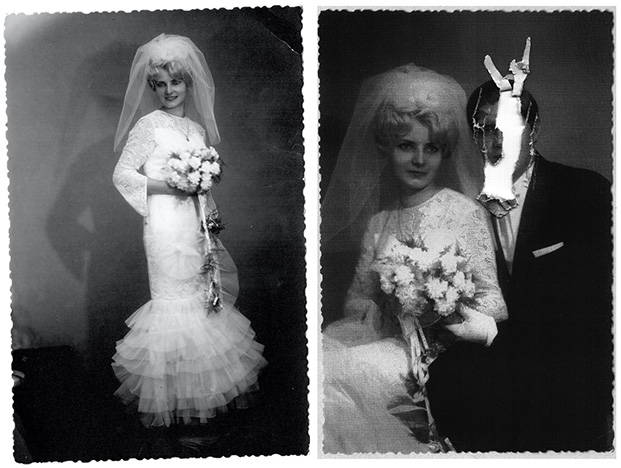
Maria Wiśniewska
„[…] przyrzekam, że uczynię wszystko, aby nasze małżeństwo było zgodne, szczęśliwe i trwałe”.

Zofia Krzyżanowska
Księga Rodzaju, rozdział 3, werset 13: „[…] Wąż mnie zwiódł i zjadłam”.
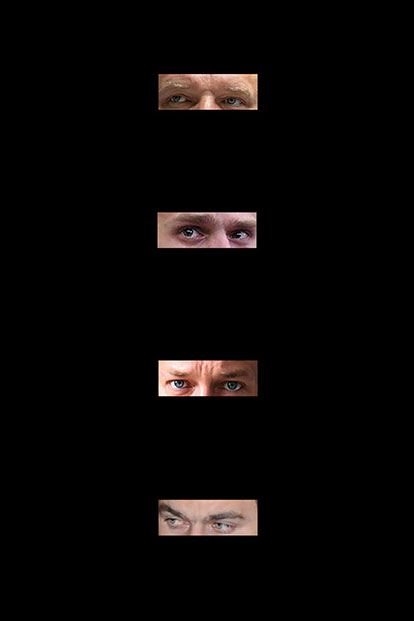
Aleksandra Murawska
Arek K. skazany na dożywotnią karę pozbawienia wolności za podwójne morderstwo. Po prawie 20 latach proces został wznowiony i udowodniono jego niewinność. Podczas śledztwa zignorowano nagranie kamery monitoringowej z miejsca zdarzenia, a kluczowym dowodem okazały się zeznania świadków incognito.
Tomasz K. skazany na 25 lat pozbawienia wolności za zbiorowy gwałt i morderstwo w sylwestrową noc w 1996 roku. Za istotne dowody uznano zeznania sąsiadki, której rysopis przestępcy przypominał rysy K. Oskarżony świętował Nowy Rok we Wrocławiu, co potwierdziło 12 osób obecnych na imprezie. Po jego aresztowaniu zaniechano poszukiwania reszty sprawców, mimo że już w trakcie śledztwa dowody coraz wyraźniej obarczały winą innego człowieka. Po 18 latach K. został uniewinniony.
Adam D. skazany na dożywotnią karę pozbawienia wolności za morderstwo. Wyrok zmniejszono później do 25 lat. Zeznania świadków i rysopisy sporządzone przez policję nie odpowiadały D., a dowody nie potwierdzały jego winy. Do wyroku przyczyniła się zbieżność imion i miejsca zamieszkania oraz fakt, że D. już wcześniej był związany z mafijnym środowiskiem. Mimo, że sprawą zajęła się Helsińska Fundacja Praw Człowieka, Adam D. wciąż pozostaje w więzieniu.
Piotr M. skazany na dożywotnią karę pozbawienia wolności za podwójne morderstwo. Wyrok zmniejszono do 25 lat. Piotr jest upośledzony umysłowo, ma umysłowość dziecka. Ma trudności z formułowaniem skomplikowanych zdań i jest podatny na manipulację. Podczas śledztwa nie ujawniły się żadne twarde dowody przeciwko oskarżonemu. Piotr przyznał się do popełnienia przestępstwa najprawdopodobniej na skutek zastraszenia podczas nieprotokołowanego przesłuchania, na którym zabrakło psychologa. Mimo niepodważalnej niezdolności do zaplanowania zbrodni idealnej (na miejscu przestępstwa nie znalazły się żadne ślady zabójcy) spotęgowanej dużą ilością alkoholu, który podejrzany miał wypić we wspomnianym dniu, został uznany za winnego. Starania między innymi ze strony Rzecznika Praw Obywatelskich nie przyniosły skutku, Piotr M. wciąż przebywa w więzieniu.
Czy można stworzyć idealny system prawny, który wyklucza błędy i niesprawiedliwe wyroki? Taki, który chroni obywateli i ściga prawdziwych przestępców? Najprawdopodobniej nie, ponieważ tworzą go ludzie, których natura jest niedoskonała. Arek K., Tomasz K., Adam D. i Piotr M. padli ofiarą systemu, który umożliwia skazanie niewinnych ludzi za niepopełnione zbrodnie. We wszystkich tych sprawach niesprawiedliwe wyroki poprzedziły przyspieszone procesy, brak niepodważalnych dowodów, niewiarygodne zeznania, zastraszanie świadków, a wreszcie ukrywanie dowodów wskazujących na niewinność oskarżonych oraz manipulacja tymi, które rzekomo miały ich pogrążyć. Wiele wskazuje na to, że przywołane wyroki były celowym i świadomym działaniem, mającym na celu ukrycie prawdziwych przestępców i zatuszowanie niewygodnych dla policji i urzędników okoliczności. Czy system jest aż tak niedoskonały, aby można było nim dowolnie manipulować?
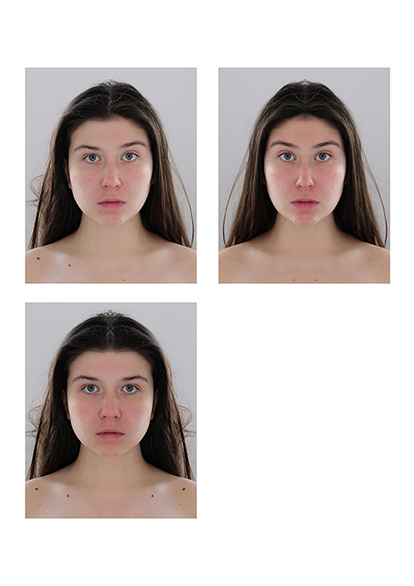
Sonia Dudek
Mówi się, że piękno tkwi w proporcjach i symetrii. Ludzka uroda bazuje na niedoskonałościach i niepowtarzalności, które według neuropsychologów są nam wręcz potrzebne.
W mojej pracy chciałam zastanowić się nad tym tematem w kontekście asymetrii twarzy, poprawiania wyglądu, a tym samym dążenia do nierealnych standardów piękna.
Warto zastanowić się, co tak naprawdę jest błędem: perfekcyjna symetria, będąca zupełnie nowym tworem, czy nieprawidłowości, dzięki którym jesteśmy wyjątkowi?

Barbara Pazio
Bez komentarza.
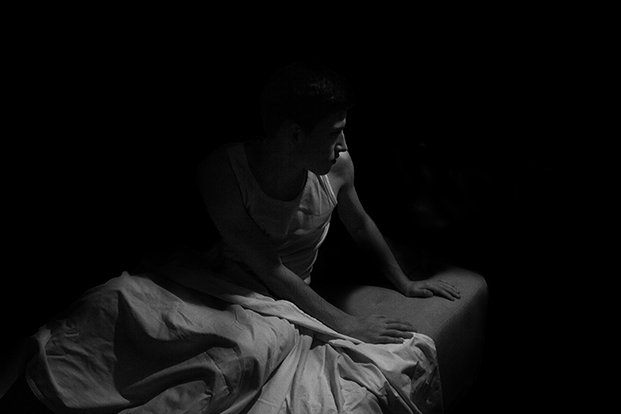
Barbara Gdula
Errare humanum est to sentencja łacińska oznaczająca ‘mylić się jest rzeczą ludzką’. Moja fotografia przedstawia człowieka, który taki błąd popełnił. Nikt nie jest idealny, wszyscy je popełniamy, mają one wpływ na nasze życie, często ich żałujemy. Mój bohater też znalazł się w takiej sytuacji bezsilnego rozpamiętywania swoich błędów, ale postanowił jednak wstać z łóżka, przestać się zadręczać, aby iść dalej i starać się nie popełniać tych samych błędów. Czerń na zdjęciu symbolizuje ponury, depresyjny nastrój, który często towarzyszy nam, kiedy się o coś obwiniamy. Z kolei miękkie, delikatne białe światło padające na powstającą postać symbolizuje dalszą walkę o bycie lepszą wersją samego siebie. Oświetlenie i stylistyka zdjęcia inspirowane są sztuką barokową, obrazami o wyraźnym, mocnym światłocieniu, dynamicznymi pozami i przekazem rodem ze średniowiecza, powracającym do bardziej uduchowionego stylu życia – wezwaniu do skupienia się na własnej grzeszności i dążeniu do wyzbycia się jej.

Natalia Parandyk
Quidquid Latine dictum sit, altum videtur – ‘cokolwiek powiesz po łacinie, brzmi mądrze’.
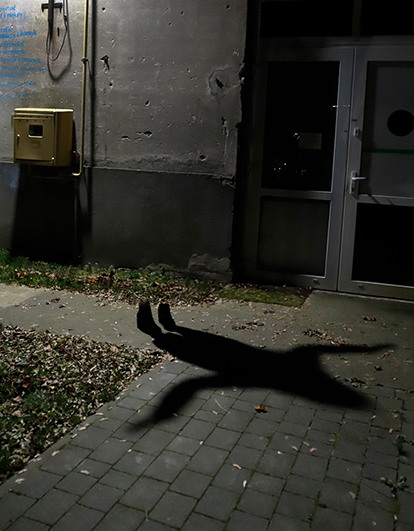
Sandra Okrasa
Bez komentarza.

Miron Dunikowski
Przedstawione przeze mnie fotografie w sposób metaforyczny ukazują przewodnie hasło. Zamglona sceneria i światło lamp wprowadzają niepokój, sugerują drogę i poszukiwanie, być może bezskuteczne. To naturalne, że człowiek w momencie zagubienia kieruje się w stronę światła.

Edyta Bury
Błądzić jest rzeczą ludzką, ale nie zwierzęcą.
Na przestrzeni wieków, wiele dzieł opisywało, jak zwierzęta służyły człowiekowi. W Pompejach zachowały się dowody, że już w starożytności ludzie używali psów jako przewodników dla osób niewidomych. Na ścianie jednego z domów widnieje malowidło kobiety, do której zbliża się ślepiec prowadzony przez małego pieska. Istnieje również legenda o celtyckim królu Odranie, który miał psiego przewodnika. Trzynastowieczny chiński zwój zawiera rysunek przedstawiający niewidomego prowadzonego przez psa. Wiele podobnych przykładów można spotkać w artefaktach z różnych wieków. To pokazuje, od jak dawna psy pomagały nam – błądzącym we mgle ludziom. Pomagają nam też w innych aspektach życiowych. Rozróżniamy na przykład psy ratownicze – wyprowadzające ludzi z płonących budynków, policyjne – pomagające wykryć niebezpieczne substancje. Dużo im zawdzięczamy. Dzięki naszym zwierzakom możemy błądzić bez strachu, zawsze bowiem znajdzie się ktoś, kto nas poprowadzi.
